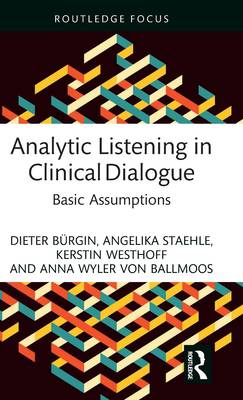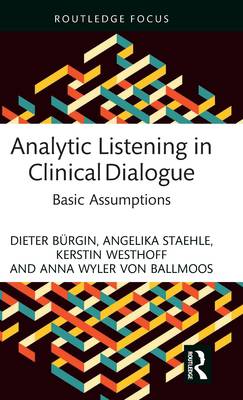
- Retrait gratuit dans votre magasin Club
- 7.000.000 titres dans notre catalogue
- Payer en toute sécurité
- Toujours un magasin près de chez vous
- Retrait gratuit dans votre magasin Club
- 7.000.0000 titres dans notre catalogue
- Payer en toute sécurité
- Toujours un magasin près de chez vous
Analytic Listening in Clinical Dialogue
Basic Assumptions
Dieter Bürgin, Angelika Staehle, Kerstin Westhoff, Anna Wyler Von BallmoosDescription
Analytic Listening in Clinical Dialogue focuses on the work of four leading clinicians as they assess how their unconscious basic assumptions impact their clinical work.
Using the case study of a seven-year-old boy, the authors evaluate a videotaped psychoanalytic first interview and exchange their mutual clinical approaches. Their discussions uncover the way that unconscious basic assumptions arise from the core of one's personality and act as the pillars that support primary- and secondary-process thinking. These fundamental models of thought and emotion result in convictions which play a key role in the processes of understanding, evaluating, classifying, anticipating and regulating. The authors show how an 'analytic listening' approach can also be used to good effect in supervisions and intervisions, as it provides a path out of the domain of 'being right' into a space of what is shared as well as what is different. They argue that this method allows an analyst's own blind spots to be reduced.
Translated from the original German, Analytic Listening in Clinical Dialogue will be of great interest to psychoanalysts, psychotherapists and psychologists.
Spécifications
Parties prenantes
- Auteur(s) :
- Editeur:
Contenu
- Nombre de pages :
- 88
- Langue:
- Anglais
- Collection :
Caractéristiques
- EAN:
- 9781032269597
- Date de parution :
- 15-08-22
- Format:
- Livre relié
- Format numérique:
- Genaaid
- Dimensions :
- 140 mm x 216 mm
- Poids :
- 258 g

Les avis
Nous publions uniquement les avis qui respectent les conditions requises. Consultez nos conditions pour les avis.






